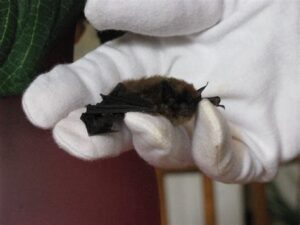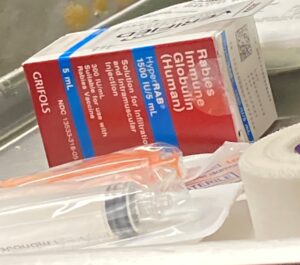RABIES!!! Yes, it’s a terrifying word. When we think of Rabies we usually think of rabid dogs, foaming at the mouth, biting everything they see, right? But we don’t often think about the other creatures in the night that can also carry rabies. Or the skunks, raccoons, foxes, and even coyotes, or cows!? What? Yes, cows and horses can get rabies, as can sheep and goats, not to mention your dogs and cats.
Rabies is a virus that once contracted and symptoms appear, is almost always fatal. That goes for the dog, the skunk, the coyote, or the cow. Or US. Yes us as in you & me. Humans.
This has been a problem for many developing countries since time began and continues to this day.
According to the CDC, here in the United States,
In the United States today, human fatalities are rare but typically occur in people who do not seek prompt medical care. While the exact reason for not seeking care is often unclear, lack of awareness of the risk of rabies is thought to be an important factor. This is of particular concern for bat bites, since bats can have small teeth and leave bite marks that are the size of the tip of a pencil.
From 1960 to 2018, 127 human rabies cases were reported in the United States, with roughly a quarter resulting from dog bites received during international travel. Of the infections acquired in the United States, 70% were attributed to bat exposures.
The rabies virus infects the central nervous system. If a person does not receive the appropriate medical care after a potential rabies exposure, the virus can cause disease in the brain, ultimately resulting in death. Rabies can be prevented by vaccinating pets, staying away from wildlife, and seeking medical care after potential exposures before symptoms start.
How can you prevent rabies in animals?
![[es-us] Copy of animals_lg.jpg small dog](https://www.cdc.gov/rabies/images/animals_lg_1.jpg)
*There are several things you can do to protect your pet from rabies.
First, visit your veterinarian with your pet on a regular basis and keep rabies vaccinations up-to-date for all cats, ferrets, and dogs.
Second, maintain control of your pets by keeping cats and ferrets indoors and keeping dogs under direct supervision.
Third, spay or neuter your pets to help reduce the number of unwanted pets that may not be properly cared for or vaccinated regularly.
Finally, call animal control to remove all stray animals from your neighborhood since these animals may be unvaccinated or ill.* https://www.cdc.gov/rabies/prevention/animals.html
Cats are more likely than dogs to NOT get vaccinated for rabies as not enough counties in California or the USA require it, as they do for dogs. Sadly, many cats are euthanized as a result as they are the ones most likely to come in contact with a bat. I have always been a huge promoter of vaccinating your cat(s) because again, they are more likely to come in contact with a bat if they go outside. Even if they don’t, and a bat gets into your house, your cat will undergo a very long and strict quarantine, and if not vaccinated could be euthanized to prevent spreading the virus.
Rabies is a world-wide problem. If you travel outside of the US, be sure to be aware of your surroundings and take precautions to avoid wild or stray dogs or cats. Most rabies deaths due to dog bites are from people being bitten in a foreign country, not getting treatment, then flying home, getting ill and dying. Most rabies deaths in the US itself is from bats:
Wild animals accounted for 92.7% of reported cases of rabies in 2018. Bats were the most frequently reported rabid wildlife species (33% of all animal cases during 2018), followed by raccoons (30.3%), skunks (20.3%), and foxes (7.2%).
Between 2013-2017, bats with rabies were found in every state except for Hawaii. Skunks with rabies have been found in parts of California, the Midwest, Texas, Kentucky, Virginia, North Carolina, and Tennessee. Raccoons with rabies have been found in the South and Eastern states. Foxes with rabies have been found in Alaska, Arizona, and New Mexico. Foxes and skunks with rabies have been found in Arizona, New Mexico, and Texas. Mongoose with rabies have been found in Puerto Rico.
https://www.cdc.gov/rabies/location/usa/surveillance/wild_animals.html
So get your pets vaccinated and if you are in Veterinary Medicine, get YOURSELF vaccinated!! I tell all of my students to get this done ASAP as I never was given the opportunity to be vaccinated. I lost months of sleep over this as I was bit (once very badly) and while the animal was always quarantined and deemed ok, twice I had close calls where the pet escaped before the quarantine was up. Don’t let this happen to you.
So, having said all of that, I am NOW vaccinated for the first time because I had a potential bat bite on my arm Friday evening at 10:00. I was on my porch and the light blinked off, scaring something that brushed my arm. After washing it off and pouring rubbing alcohol on it, I found two tiny pinhole punctures.
I went to the ER where they very promptly jumped into action and gave me 5 mls of immunoglobulin infiltrated around the wounds and a hefty 1 ml rabies vaccination. The doctor and the nurses were very concerned, very compassionate and took me ( and the situation) very seriously. The doctor told me she was convinced I got bit on the fly by a very scared bat. Whatever brushed my arm was rather large, as in as big as a bird. Bats are very small, no bigger than a robin probably, which is exactly the size of what flew by me. You can see from the above photos the size of one (a brown bat, Myotis lucifugus), and one flying.
Take it from me, the worry is overwhelming when you work with animals as long as I have. We are 300% more exposed to rabies than the average person. I am glad I am not in a clinical setting anymore for that reason, but the irony of the situation hasn’t escaped me one iota.





